- Home
- Elmore Leonard
Last Stand at Saber River Page 13
Last Stand at Saber River Read online
Page 13
“I’m going to.”
“But you’d have let Austin kill him.”
“It wasn’t your brother Cable shot down,” Duane said flatly. “That’s the difference.”
“He took him in a fair fight.”
“We’re not even sure of that. All we know is Joe Bob and Royce came home facedown over their saddles,” Duane said. “And it wasn’t your daughter he—”
Duane stopped. His eyes went to Cable who was still on one knee, but watching Duane now.
“Get him up.”
Dancey moved aside. He said, “Go ahead,” and stepped back to the edge of the platform near Janroe. The Dodd brothers pulled Cable to his feet. They planted themselves close to him, each holding an arm with both hands. Cable stood quietly, making no attempt to free himself. Behind him, Dancey could see Martha and the little girl in the square of light formed by the doorway. Martha seemed calm, Dancey judged. But you couldn’t tell about women. The little girl was afraid. And the little boy—Dancey’s gaze moved to the steps where Davis was squatting now—he’s wondering what they’re doing to his pa and he wouldn’t believe it if somebody told him.
Duane called, “Jimmie!” and one of the men who’d covered Cable from behind came out to the platform. Duane raised his reins, then dropped them and the man came down; but not until he’d picked up the reins did Duane dismount. He stepped down stiffly, straightened his coat, then walked around to the steps and up to the platform, past Davis without even glancing at him though he touched him with his riding quirt, in a gesture of brushing the boy aside.
His full attention was on Cable now. Duane stepped squarely in front of him, close to him, and stood for some moments in silence, his legs apart and his hands fisted on his hips. But before he spoke his hands dropped to his sides.
“I should let Austin kill you,” Duane said. “But I can’t do it. God knows everyone here would be better off for it, but I can’t pass final judgment on a mortal man, not even after he’s done what you did.”
“What did I do?” Cable asked, not with surprise or indignation, but calmly, wondering what had suddenly brought Duane here.
“Offended innocence,” Duane said. “You’d better keep your mouth shut. I’ve taken all of you I can stomach.”
“I asked a civil question.”
Duane’s quirt came up and lashed across Cable’s face. “And I said shut up!” He stepped back as Cable twisted to free himself. Wynn Dodd stumbled to one knee and Cable almost broke away, but Austin forced Cable’s right arm behind his back and jerked up on it.
“I’ll break it!”
Cable stopped struggling. He let his breath out slowly and his body seemed to sag. His eyes went to Davis still watching him from the steps, then away from the boy quickly, back to Duane.
“Do you have to do this in front of my children?”
Duane stepped close to him again. “How much respect did you show my daughter?”
“What did Lorraine say I did?”
“She didn’t have to say anything. She was all night at your place.”
Janroe, near the edge of the platform, looked at Martha, but her eyes were on her husband. He noticed Duane’s gaze move to her then.
“You hear that Mrs. Cable? Your husband and my daughter.”
“He told me about it,” Martha said quietly.
“He told you, did he.” Duane’s mouth barely moved. “Did he tell you how he dragged Lorraine into that hut?” He turned on Cable and in the motion slashed the quirt across his face. “Did he tell you how he kept her there all night?” The quirt came back across Cable’s face. “How he threatened her and forced his will on her?” He swung on Cable again and again, hacking at Cable’s cheeks and forehead with the rawhide. Cable’s eyes were squeezed closed and he would turn his head with each stinging blow. But he was off balance, leaning forward awkwardly, and he was unable to turn his body with Austin holding his arm twisted behind him. Duane struck him eight times before his arm dropped heavily to his side.
“Did he tell you all that, Mrs. Cable?”
“He told me everything that happened.”
“His version.”
“If you’ve finished, Mr. Kidston, may I take my husband inside?”
Duane stared at Martha, his face tight as he held back the temper ready to flare out at her calm, quiet manner.
He said then, “If you want him, take him. Take him anywhere you like, but not back to your house. You’re finished here, and I believe you’re intelligent enough to realize it. If you think this is unjust, that’s too bad; your husband is lucky to be alive. I’ll tell you frankly, if it wasn’t for your children he would be dead now.”
Bill Dancey watched Martha, waiting for her to speak again; but Martha said nothing, her hand on the little girl close to her side. Dancey walked across the platform. Going down the steps he patted Davis’s shoulder, but the boy pulled away from him. Dancey mounted, then looked up at Duane.
“You’ve said it. What’re you waiting for?”
Duane still faced Martha. He ignored Dancey, and said, “This evening my men leave for the horse pastures. They’ll be gone one week. If you haven’t cleared out by the time they return, we will take your husband out and hang him. That’s my last warning, Mrs. Cable.”
Duane turned and marched stiffly down the steps to his horse. The Dodd brothers followed, almost reluctantly, both of them looking back at Cable as they mounted and rode out after Duane.
Janroe came away from the edge of the platform and studied Cable’s face closely. “Duane laid it on you, didn’t he?”
Cable said nothing. He felt Martha standing next to him now, but he continued to watch the riders. When they had finally crossed the river and started up the slope, he looked at Janroe.
“That one Duane called Jimmie—what did he do with my gun? Did you see?”
Janroe stepped to the edge of the platform again and looked down. “He dropped it right there.”
“Get it for me.”
Janroe seemed to smile. “I’d be glad to.”
Cable felt Martha’s hand on his arm. He looked at her, at her soft, clear expression, at her eyes that seemed moist, though he wasn’t sure if she was crying.
She said, “Cabe, come inside now.”
He followed her through the store, through the main room to the kitchen, then sat down while Martha went to the sink. She dipped water from a bucket into a kettle, and put the kettle on the stove to heat.
Clare and Davis appeared in the doorway, staring at their father until Martha noticed them and told them to go outside and play.
Cable looked up. “No, let them stay,” he said. He motioned to the children. They came in hesitantly, as if this man with the red welts across his face was someone neither of them had ever seen before. But when he smiled and held out his arms, both of them ran to him and pressed against his chest. He kissed Clare on the cheek, then Davis. The boy’s arms went around his neck and clung to him and Cable felt the knot in his stomach slowly begin to relax.
Martha poured the warm water into a basin. She carried it to the table, then leaned close to her husband and began bathing the swollen red marks that crossed both of his cheeks, his nose and his forehead. A bruise colored his cheekbone where Austin Dodd had hit him.
Cable’s eyes raised. “Where’s Sandy?”
“Still taking his nap.”
“I’m glad he didn’t see it.”
Martha said nothing. She moved the two children aside to give herself more room, then pressed the wet cloth gently to Cable’s forehead.
“The second time they’ve seen me beaten,” Cable said. “Beaten up twice in front of my children—standing there turning the other cheek while a man rawhides my face.”
Martha raised his chin with her hand. “Cabe, you don’t have to prove yourself to them. You’re their father.”
“Something they don’t have anything to say about.”
“They’d love you under any circumstance, you know that.”
“Then it’s a question of proving myself to me.”
Martha shook her head. “It isn’t a matter of principle, a question of whether or not you’re a man. This is something that affects the whole family. We want to go home and live in peace. Clare and Davis and even Sandy, we want what is rightfully ours, but we don’t want it without you.”
“Then you want to leave here,” Cable said.
“I didn’t say that. If we run away, we lose. But if we have to bury you, we lose even more.”
“Martha, I don’t have a choice.”
She leaned close to him with her hands on the arms of the chair. “Cabe, don’t go after them just because of what Duane did.”
“You know it’s more than that.”
“You were beaten up in front of the children. Right now that’s all you can think about.”
“Sooner or later this will be settled with guns,” Cable said. “It might as well be now.”
“It doesn’t have to be that way,” Martha said urgently. “If we wait, if we can put it off—Cabe, something could happen that would solve everything!”
“Like what?”
She hesitated. “I’m not sure.”
“Martha, I’m awful tired of waiting.”
She looked at him intently. “You could go to Fort Buchanan. Put it up to the authorities.”
“You know who they’d side with.”
“But we’re not sure. Cabe, at least it’s worth trying.”
From the doorway Janroe said, “I’ve got the only way to solve your problem.” He extended Cable’s Walker Colt, holding it in the open palm of his hand. “Right here.”
Martha turned, looking at him coldly. “That would solve nothing.”
“All right,” Janroe said. “Go up to Buchanan. Tell the Yankees you’re a Rebel soldier come home to find a gang of Yankee horse-breakers using your land and threatening to hang you.” Janroe moved into the kitchen. “You know what they’d do? Supply the rope.”
Martha motioned the two children to the back door. She held it open for them, then, closing it behind them, looked at Janroe again.
“Mr. Janroe, I don’t think this concerns you.”
“Ask your husband whether it concerns me or not.” He stopped in front of Cable and handed him the revolver. “Right?”
Cable said nothing. He took the Walker and looked at it idly, holding it in both hands.
Janroe watched him. “You’re going back to your place?”
Cable nodded.
“That’s the right direction,” Janroe said mildly. His eyes remained on Cable’s lowered head. “Did you hear what Duane said about his men going off this evening? They’ll go over to some pastures Vern’s got way north and west of here and start working the herds home. Duane said they’d be gone a week.” Janroe shook his head. “They’ll be gone longer than that. And just Duane and maybe Vern will be home, just the two of them.”
Cable looked up. “You told me that once before.”
Janroe nodded. “And Duane confirmed it.” His voice lowered. “It would be easy for a man like you. Ride in there and take both of them.”
Martha came away from the door. “You’re asking my husband to commit murder!”
Janroe glared at her. “Like any soldier murders.”
“This isn’t war—he isn’t a soldier now!”
“We’ve been all through that,” Janroe said. “Whether it bothers his conscience or not, your husband doesn’t have a choice. He’s got to kill them before they kill him.”
That evening, as soon as it was dark, Janroe slipped under the platform and let himself into the locked storeroom. He measured three strides to the crates of Enfield rifles stacked against the back wall, then stood in the darkness, wondering if there would be room for the wagon-load of rifles due to arrive later that night. The rifles that were here should have been picked up days ago.
You can worry about it, Janroe thought, or you can forget it and ask Luz when she comes. She should be here within two hours. Perhaps they told her in Hidalgo why the rifles had not been picked up. Perhaps not. Either way, there was something more immediate to think about. Something raw and galling, because it was fresh in his mind and seemed to have happened only moments before though it had been this afternoon, hours ago.
He had almost convinced Cable. No, not almost or maybe. He had convinced him. He had handed the man his gun and told him to kill the Kidstons or be killed himself, and Cable had seen the pure reality of this. If he had left at that moment, he would have gone straight to the Kidston place. Janroe was sure of it.
But Martha had interfered. She talked to her husband, soothing the welts on his face with a damp cloth while she soothed his anger with the calm, controlled tone of her voice. And finally Cable had nodded and agreed not to do anything that day. He would go home and watch the house—that much he had to do—but he would not carry the fight to the Kidstons; at least not while he felt the way he did. He agreed to this grudgingly, wearily, part by part, while Martha reasoned in that quiet, firm, insisting, never-varying tone.
Perhaps if he went out to see Cable now? No, the guns were coming and he would have to be here. In the morning then; though by that time the sting would be gone from the welts on Cable’s face and that solid patience would have settled in him again.
He had convinced Cable—that was the absolute truth of it—until the woman had started in with her moral, monotonous reasoning—
Janroe straightened. He stood listening, hearing the faint sound of a horse approaching. The hoofbeats grew louder, but not closer, and when the sound stopped, he knew the horse had reached the back of the store.
Luz? No, it was too early for her. He left the storeroom, carefully, quietly padlocking the door, came out into the open and took his time mounting to the platform and passing through the darkened store. He saw Martha first, standing in the kitchen, then Luz, and saw the girl’s eyes raise to his as he moved toward them.
“You’re early.”
“They’re not coming,” Luz said.
“What do you mean they’re not coming?”
“Not anymore.”
“All right,” Janroe said. “Tell me what you know.”
“The war’s over.”
She said it simply, in the same tone, and for a moment Janroe only stared at her.
“What are you talking about?”
“It’s true,” Martha said. “They told her as soon as she reached Hidalgo.”
He looked at Martha then, seeing her face no longer composed but for the first time flushed and alive and with a smile that was warm and genuine and seemed to include even him, simply because he was here to share the news with them.
He turned to Luz again. “Who told you?”
“Everyone knows it. They told me to come back and tell you.”
“But how do they know? How can they be sure?”
“They know, that’s all.”
“Listen, wars don’t just end like that.”
“How do they end?” Martha asked, not smiling now.
“There’s some warning—days, weeks before, that it’s going to end.”
“You know how news travels out here,” Martha said.
“No”—Janroe shook his head—“we would have heard something. It’s a false alarm, or a Yankee trick. It’s something else because a war just doesn’t end like that.”
“We’re telling you that the war is over,” Martha said. “Whether you believe it or not it ended five days ago, the day we came home.”
“And they’re just finding out now?” Janroe shook his head again. “Uh-unh, you don’t sell me any of that.”
“Would they have lied to Luz?”
“I don’t even know what they told her! How do I know she even went there?”
Martha was staring at him. “You don’t want to believe it.”
“What am I supposed to believe—everything this girl comes in and tells me?”
“Luz”—Martha glanced at the gir
l—“can I take your horse?”
Janroe saw Luz nodding and he said anxiously, “What for?”
“To tell my husband,” Martha answered, looking at him again.
“You think you should?” Janroe asked. It was moving too fast again, rushing at him again, not giving him time to think, and already it was the next step, telling her husband. They would not just stand and talk about it and see how ridiculous the news was; they would bring Cable into it, and if he argued about the sense of her going she would go all the quicker.
“I mean riding out alone at night,” Janroe said. He shook his head. “I couldn’t see you doing that.”
“I think my husband should know,” Martha began.
“I believe that,” Janroe said. The words were coming easier now. “But I think I better be the one to go tell him.”
Martha hesitated. Before she could say anything, Janroe had turned and was gone. She looked at Luz, but neither of them spoke, hearing Janroe just in the next room.
When he came into the kitchen again he was wearing a hat and a coat, the armless sleeve flat and ending abruptly in the pocket, but bulging somewhat with the shape of a shoulder holster beneath the coat.
“You will see him?” Martha said. “I mean make sure he finds out?”
“Don’t worry about it.”
“And you promise to tell him everything?”
“I won’t be long.” Janroe went out the back door and mounted Luz Acaso’s dun mare.
He crossed the river and hurried the dun up the slope to the horse trail, following it north, almost blindly in the night darkness of the trees, brushing branches in his haste and kicking the dun. He moved along the ridge, though with no intention of visiting Cable.
He knew only that there was no time for Cable now. He could admit that to himself without admitting the other, that the war was over. Certainly it could be at the very edge of the end. This could be the last day. It might very well be the last day. All right, it was the last day and now there was no time for Cable. The war was not over yet, he told himself, but there was time to do only one thing now.
Four, raging, uninterrupted years of war did not end with two women standing in a kitchen and saying that it was over. You would expect that of women. It was typical. A woman would tell you anything. Lies became truth to them because they felt justified in using any means at hand to hold life to a sweet-smelling, creeping pace; to make this a woman’s existence with no room for war or fighting or so many of the things that men did and liked to do and only really proved themselves as men when they were doing them.

 Charlie Martz and Other Stories: The Unpublished Stories
Charlie Martz and Other Stories: The Unpublished Stories Elmore Leonard's Western Roundup #2
Elmore Leonard's Western Roundup #2 Fire in the Hole
Fire in the Hole Tishomingo Blues (2002)
Tishomingo Blues (2002) Djibouti
Djibouti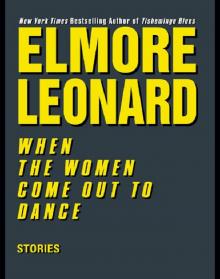 When the Women Come Out to Dance: Stories
When the Women Come Out to Dance: Stories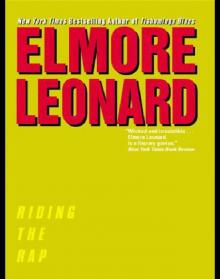 Riding the Rap
Riding the Rap Moment of Vengeance and Other Stories
Moment of Vengeance and Other Stories Raylan
Raylan Touch
Touch Mr Majestyk
Mr Majestyk Swag
Swag Road Dogs
Road Dogs La Brava
La Brava The Hot Kid
The Hot Kid Valdez Is Coming: A Novel
Valdez Is Coming: A Novel Be Cool
Be Cool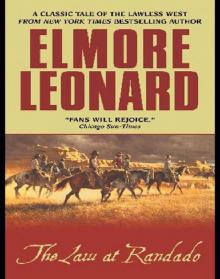 The Law at Randado
The Law at Randado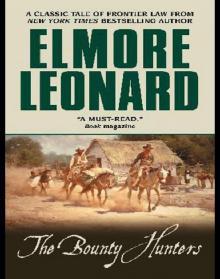 The Bounty Hunters
The Bounty Hunters When the Women Come Out to Dance
When the Women Come Out to Dance 310 to Yuma and Other Stories (1953)
310 to Yuma and Other Stories (1953) Tishomingo Blues
Tishomingo Blues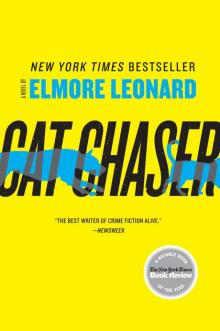 Cat Chaser
Cat Chaser Pagan Babies
Pagan Babies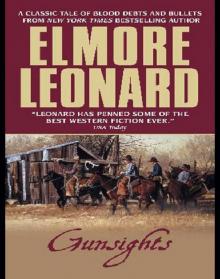 Elmore Leonard's Western Roundup #1
Elmore Leonard's Western Roundup #1 52 Pickup
52 Pickup Stick
Stick The Moonshine War
The Moonshine War Valdez Is Coming
Valdez Is Coming City Primeval
City Primeval Rum Punch
Rum Punch Out of Sight
Out of Sight Naked Came the Manatee (1996)
Naked Came the Manatee (1996) Killshot
Killshot Cuba Libre
Cuba Libre Forty Lashes Less One
Forty Lashes Less One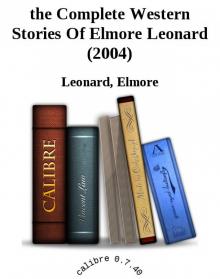 The Complete Western Stories of Elmore Leonard
The Complete Western Stories of Elmore Leonard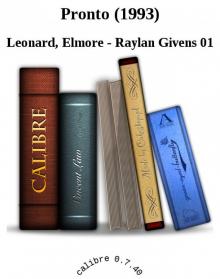 Pronto
Pronto Split Images
Split Images Last Stand at Saber River
Last Stand at Saber River The Switch
The Switch Three-Ten to Yuma and Other Stories
Three-Ten to Yuma and Other Stories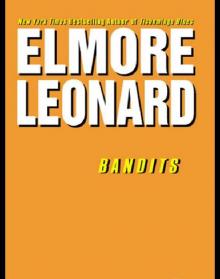 Bandits
Bandits Comfort to the Enemy and Other Carl Webster Stories
Comfort to the Enemy and Other Carl Webster Stories Hombre
Hombre Trail of the Apache and Other Stories
Trail of the Apache and Other Stories LaBrava
LaBrava Gold Coast
Gold Coast Jackie Brown
Jackie Brown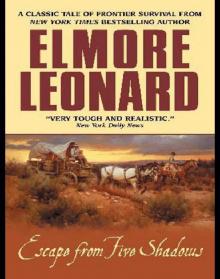 Escape From Five Shadows
Escape From Five Shadows Karen Makes out (1996)
Karen Makes out (1996)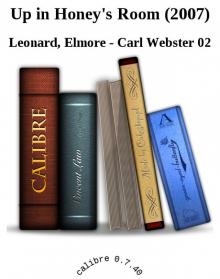 Up in Honey's Room
Up in Honey's Room How Carlos Webster Changed His Name to Carl and Became a Famous Oklahoma Lawman (2003)
How Carlos Webster Changed His Name to Carl and Became a Famous Oklahoma Lawman (2003) Mr. Paradise
Mr. Paradise The Hunted
The Hunted Freaky Deaky
Freaky Deaky Louly and Pretty Boy (Ss)
Louly and Pretty Boy (Ss)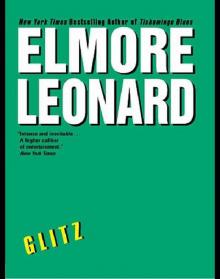 Glitz
Glitz A Coyote's in the House
A Coyote's in the House The Big Bounce jr-1
The Big Bounce jr-1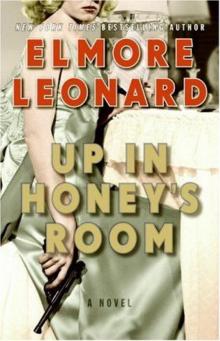 Up in Honey's Room cw-2
Up in Honey's Room cw-2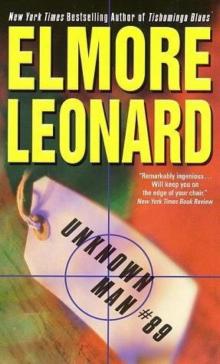 Unknown Man #89 jr-3
Unknown Man #89 jr-3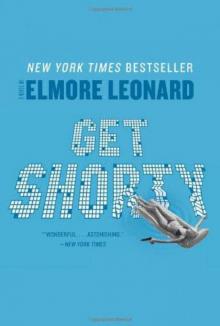 Get Shorty: A Novel cp-1
Get Shorty: A Novel cp-1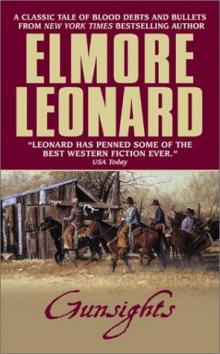 Gunsights
Gunsights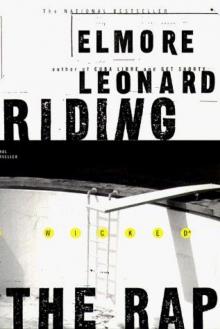 Riding the Rap rg-2
Riding the Rap rg-2